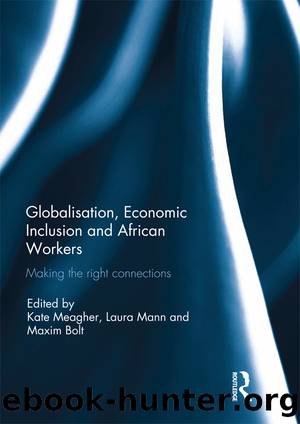Globalization, Economic Inclusion and African Workers by Kate Meagher Laura Mann Maxim Bolt

Author:Kate Meagher, Laura Mann, Maxim Bolt [Kate Meagher, Laura Mann, Maxim Bolt]
Language: eng
Format: epub
Tags: Nonfiction, Social & Cultural Studies, Social Science, Demography, Political Science
ISBN: 9781315436470
Publisher: Taylor and Francis
Published: 2018-10-03T04:00:00+00:00
I. Introduction
Business Process Outsourcing (BPO) can loosely be described as service work contracted out to a third party. The term encompasses a range of activities that include customer service work, data entry, transcription, digitisation, financial accounting, auditing and other higher value-knowledge processing such as content development, animation, legal services, engineering design and data analytics. The BPO sector first emerged in Northern economies in response to deregulation and competitive pressures inducing organisations to restructure, increase efficiencies and maximise shareholder value (Batt & Moynihan, 2002; Davis, 2009). Work tasks that once took place within firms came to be standardised and outsourced to outside organisations, often using information and communication technologies (ICTs). Work was first moved to lower wage areas within national economies (Taylor & Bain, 2008) but by the early 2000s, changing communication capacities had allowed such work to be offshored to countries such as India, the Philippines and China, effectively creating a âglobalâ1 marketplace for services (Dicken, 2003; Bryson, 2007; Malecki & Moriset, 2008). The increasing geographical spread of BPO has resulted both from pressures to reduce costs and from desires by multinational companies (MNCs) to spread risk across markets (Kleibert, 2014).
BPO has been seen to represent very different facets of economic globalisations. On the one hand, it has been described as offering potential developmental benefits, allowing developing countries to leapfrog industrialisation, acquire new skills and capital, and participate in a flatter and more frictionless global economy (Dossani & Kenney, 2007; Friedman, 2006). Fernandez-Stark, Bamber, and Gereffi (2011, p. 1) thus write, âthe industry provides a clear illustration of how globalisation has provided opportunities for both employment and business formation in developing countriesâ. However, others have voiced more cautious assessments, stressing that benefits are âuncertain and contingentâ (Levy, 2005, p. 691) and that the globalisation of services is likely to benefit more highly skilled groups while weakening the security, economic prospects and bargaining power of less skilled workers (Held, 1999). Anxieties about BPO are particularly pronounced in relation to developed economies where fears of job losses dominate discussions.
Since 2004, Kenyan policy-makers and businesspeople have wanted a share of the market. Many hoped the 2009 arrival of fibre optic internet cables into East Africa would allow these economies to break their dependence on primary commodity exports and use the affordances of better internet connectivity to transition into tertiary and quaternary service sector exports (Graham & Mann, 2013). The original vision for the BPO sector in Kenya was therefore export oriented, Kenyan owned and oriented towards the creation of jobs (Graham, Andersen, & Mann, 2015). Estimates released by the Government of Kenya (2007a, b) predicted the sector would create 20,000 direct BPO jobs and contribute 10 billion Kenyan shillings to GDP (approximately 114 million USD).
Few connected the deeper penetration of high speed internet nor the development of an export-oriented BPO sector with the potential for greater domestic outsourcing within Kenya itself (that is Kenyan BPO companies conducting work for other Kenyan companies). Despite a trend of increasing subcontracting already taking place (Mazumdar &
Download
This site does not store any files on its server. We only index and link to content provided by other sites. Please contact the content providers to delete copyright contents if any and email us, we'll remove relevant links or contents immediately.
Collaborating with Parents for Early School Success : The Achieving-Behaving-Caring Program by Stephanie H. McConaughy; Pam Kay; Julie A. Welkowitz; Kim Hewitt; Martha D. Fitzgerald(899)
Entrepreneurship Education and Training: The Issue of Effectiveness by Colette Henry Frances Hill Claire Leitch(666)
Adding Value to Policy Analysis and Advice by Claudia Scott; Karen Baehler(499)
Materializing the Middle Passage by Jane Webster;(497)
Race and American Political Development by unknow(490)
Sociological Perspectives of Health and Illness by Constantinos N. Phellas(479)
American Government and Politics Today by Steffen W. Schmidt Mack C. Shelley Barbara A. Bardes(477)
Human and Global Security : An Exploration of Terms by Peter Stoett(473)
Control Of Oil - Hardback by Kayal(468)
Advances in Child Development and Behavior, Volume 37 by Patricia J. Bauer(403)
The Disappearance of Rituals: A Topology of the Present by Byung-Chul Han(401)
The Catholic Church and European State Formation, AD 1000-1500 by Jørgen Møller(392)
The World According to China by Elizabeth C. Economy(387)
Theories of Counseling and Psychotherapy: A Case Approach by Nancy L. Murdock(372)
Left Is Not Woke by Susan Neiman(371)
Application of classical statistics, logratio transformation and multifractal approaches to delineate geochemical anomalies in the Zarshuran gold district, NW Iran by unknow(365)
Cross-Cultural Child Development for Social Workers by Lena Robinson(358)
Turkey's Relations with the West and the Turkic Republics: The Rise and Fall of the Turkish Model by Idris Bal(353)
Japan's Ainu Minority in Tokyo by Mark K. Watson(341)
